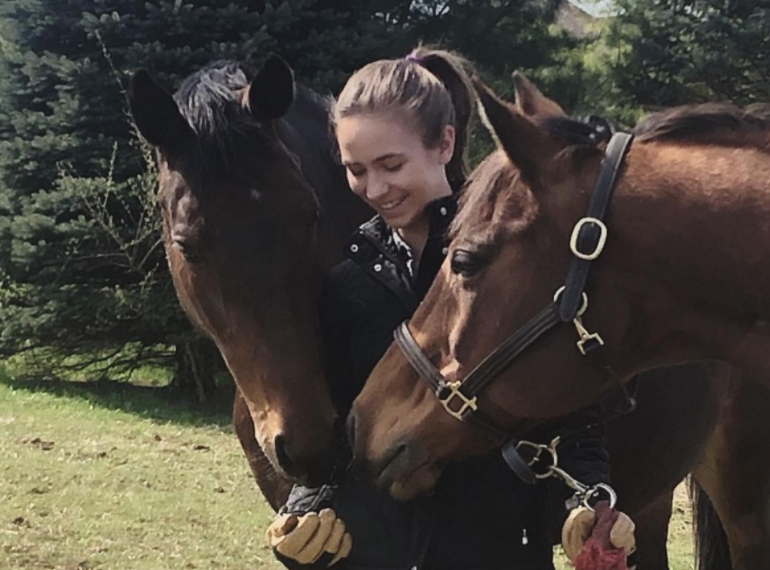As someone drawn to small, spicy, sensitive horses – usually mares – I’ve had to spend tons of time identifying their energy, and recognizing and controlling my own. It all loops back to the elusive feel horsemen and women discuss. While defining what feel is in working with horses varies from rider to rider, I believe working with feel requires a deeper level of awareness, empathy, and compassion for your partner.
 I love my ladies!
I love my ladies!
For some guidance on how to best support my strong and independent mares, I devoured Mark Rashid’s “Horses Never Lie”, which encourages those working with horses to work from a place of compassion and understanding. Throughout the book, numerous examples are provided that show how consistent, clear, and passive leadership encourages partnership more so than the dominating alpha leadership approach often utilized in training. I want my horses to want to work with me happily, so ever since reading this book, I’ve been thinking non-stop about how to use this framework.
How can I show up as a partner and a leader for my horses? How can I grow in my awareness to pick up such subtle cues in their communication? I’ve found that showing up for my horse as a consistent caregiver and teammate can help me inch my way closer to developing this feel, as I’m able to read them easier, recognizing when their energy is calm, alert, or unsettled. If something feels “off”, being sensitive enough to identify variation in environments, behavior, or my own mood and actions can give me the clarity to know which tools to use to better work with my horse that day, bringing them towards a place of relaxation and happiness.
This approach may be more time consuming, or require more patience, pushing us to look at each situation truly from the horse’s perspective. However, I have experienced how drastically this empathy and compassion can improve relationships with horses.
Once, I was working with a gelding coming back from stall rest. This horse was incredibly sweet, but very, very sensitive. He would often work himself up over what seemed to be small hiccups in training, such as miscommunications that led to awkward jumps, or a slight shift in the saddle that would take him by surprise. Although he could be reactive, his personality was one that would never hurt a fly; he always was gentle, and always tried to do the “right” thing.
We were schooling on the flat one day, and it was going beautifully, so I decided to try a little canter (the first in a few months). However, just as we did so, something spooked him, causing him to swing his haunches into the ring fence. This promptly led to a flurry of jumps, leaps, and explosions into the air. Luckily, there was no one or nothing else around that would make the situation dangerous, so I was able to take a moment to assess the situation before deciding how to deal with it.
Knowing the horse, I knew he would get more and more anxious as time went on, resulting in any movement from me to grow increasingly intense in his mind. Therefore, instead of working to control him by cracking down on him or getting strong, I tried to gradually bring my energy down, taking deep breaths to encourage him to do the same. As I did this, I allowed him to move forward with me, reassuring him as I went.
Almost as quickly as the explosion happened, he was settled back down. After we processed what happened, and I checked him for any cuts, we picked up the canter and ended the session on a great note.
It took a lot of self control to calm my own adrenaline to think through the situation and figure out what was the best way to move forward for him. In holding his emotions, feelings, and needs central, I was able to diffuse a situation that otherwise could have escalated quickly. In doing so, I was able to keep everyone safe, maintain my trust with the horse, and end on a positive note.
Holding compassion central in our training with horses is key. As I’ll discuss in my next article, this skill is critical outside of the horse world too. Practicing my ability to maintain this compassion with myself and other people has drastically improved my mood and varied my approach in dealing with daily challenges.

